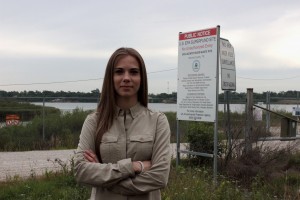Suing Polluters: Texas Again Considers Curbing County Attorneys

Dave Fehling / StateImpact
Jackie Young at San Jacinto River Superfund site tells why local lawsuits are important in our Radio Story
After being the target of intense lobbying that drew criticism in last year’s Texas legislature, lawmakers will again hear why big business wants restrictions on local governments that go after polluters in court. The House Judiciary Committee will take up the issue at a hearing May 16th.
Bills to curtail pollution lawsuits by local governments died in the last legislative session.
“I wasn’t surprised to see it still out there. There’s an effort to limit cities and actually it’s been going on for several years now,” said Bennett Sandlin, Executive Director of the Texas Municipal League.
Sandlin cites cases like one recently in which Ector County sued an oil field services company after acid was dumped into Odessa’s sewage system.
“This is a situation where cities — to protect their water supply — occasionally have to go after polluters who aren’t being adequately regulated at the state or the federal level,” Sandlin told StateImpact. “Cities are not real anxious to do this, it’s not in their wheelhouse to bring environmental litigation it’s just when you have a case like pouring toxic chemicals down a sewer system, cities feel backed into a corner and in some cases they have to do this.”
Counties Hire Private Lawyers
Last year, there was a bill to give the Texas Attorney General the power to settle environmental lawsuits without the consent of local government. Another tried to restrict local litigation by banning city and county governments from using private law firms to file the suits.
Harris County is using private lawyers in on-going litigation over a decades-old waste dump along the San Jacinto River which now involves companies including Waste Management Inc. which acquired a company previously liable for the site. The county has used similar tactics to go after AT&T Services Inc. for underground gasoline storage tanks that leaked.
Big industry says those tactics are an unfair money grab by local governments. Industry groups say private lawyers will try to inflate their fees by getting big penalties against companies that may have already agreed to do clean-ups under agreements with state or federal environmental regulators.
“The state’s objective is clean up the contamination and make someone else other than the taxpayers do it,” said Steve Minick, VP of Government Affairs at the Texas Association of Business.
“if everyone one of those companies can be sued by the local jurisdiction solely to collect money the state didn’t collect…(then) no company in their right mind in Texas is going to build their company on property that’s ever been used for commercial industrial purposes,” Minick told StateImpact.
‘One of the State’s Most Serious Challenges’
Those concerns apparently led House Speaker Joe Straus to put the issue back under consideration, listing it among the “interim charges” that he wants next year’s session of the Texas Legislature to address.
But supporters of local government litigation ask, why?
“Lawmakers should not be bringing this up, lobbyists should move on,” said Alex Winslow, Executive Director of Texas Watch, a corporate accountability group. He contends it’s a case of big industry wanting the more “business friendly” state regulators to have the final say in pollution cases.
“Polluters would rather have those bureaucrats in Austin handle these matters than local authorities that are accountable directly to their communities,” said Winslow.
